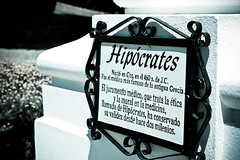Dear Graduates, As you ponder what to do next in your lives, lofty maxims encircle you: "Follow your passion." "Shoot for the stars." "Live the life you imagine." Ethicist William MacAskill recently added another to the list: "Do something valuable."
"Do something that genuinely helps others and makes the world a better place in a major way," he writes. "That’s the way to have a happy, fulfilled life."
While I believe altruism is a fine goal, and one toward which I encourage my own students, I also think it overlooks the basic element required for a worthy life. It assumes too much and asks too little. Allow me to explain.
This morning I learned that my daughter was once in harm's way. Her infant childcare provider, whom we abruptly after a child's suspicious accident, is being investigated for physical abuse. Damning evidence heaps about her. I can't help wondering how my daughter escaped attack. Or whether she didn't. The latter is a thought too overwhelming to bear.
As I ponder this, and the many recent events in our country, I come to this plea: graduates, do no harm. This is the greatest aim toward which you can aspire.
Regardless of your occupation, you will probably not be asked to take "do no harm" on professionally. It's not even written in the Hippocratic Oath, which is rarely used besides. It is then incumbent upon you to choose to look the words deep into their darkened curves and consider what they truly mean. To score them onto your chest, your heart, your very soul. To live by them when no one is holding you accountable for doing so. Choosing to carry this vow with you as you inch beyond the gauzy veil of college is a momentous decision.
It may also prove your greatest challenge.
For I don't just mean harming in large ways. Thankfully the scarred creatures who undertake bombings of innocent citizens, who batter defenseless children, who send poisons through the mail, they are few and far between. We can rest reasonably assured that you will not turn into one of them.
But in your lifetime you will have many opportunities to harm others. More opportunities than you can count. Most will provoke no censure. Many will remain hidden. Some will even lead to praise.
You can vow to forgo such opportunities. Regardless of their outcome. Regardless of whether the intended victim is someone you love or someone you've never met. Regardless of whether there is a victim at all.
You can also vow to be alert to the harm that comes as a byproduct of your actions, the most insidious opportunities of all. You will not be able to deter every one. You will only be able to prevent what is within your scope of awareness and resources. To expect more would be to live a life of anxiety and paranoia. To expect less is to be negligent.
So take it upon yourself to raise your awareness bit by bit, day by day; to continue learning about the world when no one is grading you on your efforts. Simultaneously work to improve your resources - mental, social, financial - for reasons that go far beyond your personal benefit. This is what people mean when they implore you to "do good" after college. In actuality they mean, improve yourself in order that you can avoid doing harm.
One arena for improving yourself that is surely on the front of your mind is your post-graduate job. A job doesn't have to be altruistic, it doesn't have to speak to your truest desires, it doesn't even have to fully pay the bills in order to be valuable.
A valuable job is one that doesn't cause damage. Including to yourself.
The jobs that require you to work gruelingly long hours that deplete your resolve, that ask you to harass or exploit or manipulate others in the name of financial gain, that make you feel like someone you don't recognize, that cause you to be so burnt out that you snap at your loved ones and withdraw from the people who need you most, those are the jobs not to take. Or at least the ones not to keep. Even if your job is not "worthy" of posting on Facebook, is labeled "beneath your potential" by parents and professors, or generates no income at all (e.g., parenting), if the job fits you well enough such that you do no harm to self or others, it is an excellent job, and one that all would be wise to envy.
After graduation I do wish you greatness and the fulfillment of potential and the stroking of the stars far above. But I wish even more that your wake be free of hurt and pain and ruin, small and large, suffered by you and those around you. If you manage as much, you will be among the fortunate few. And you will have lived a life of which you can be quite proud.
It sounds easy to do no harm after graduation. In fact, it may be the hardest thing you aim to do. (Photo credit: Wikipedia)
Although the Hippocratic Oath doesn't contain the phrase "do no harm," you can choose to embrace the sentiment. (Photo credit: Lionel Fernández Roca)


